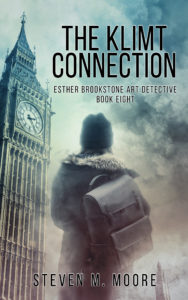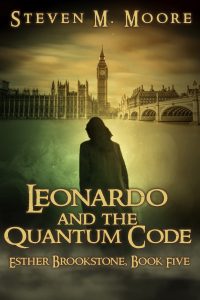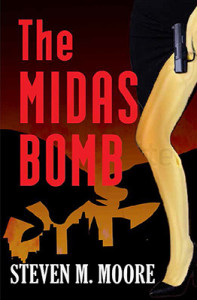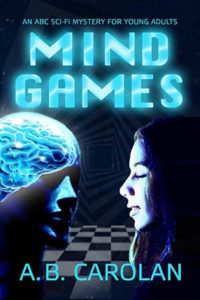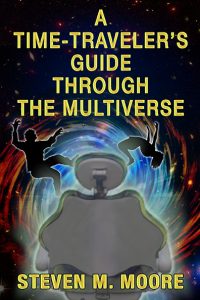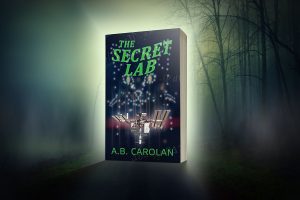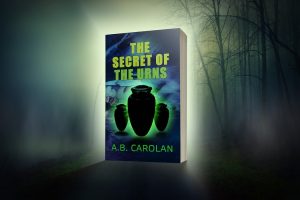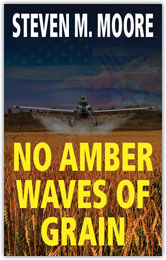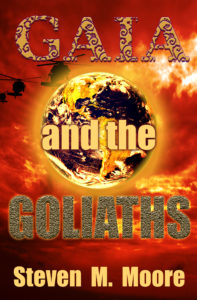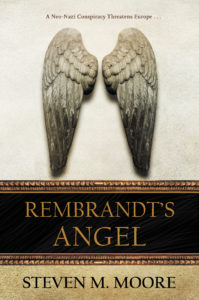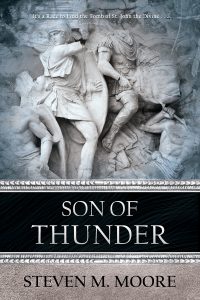[Note from Steve: This is the third story about the “Earl of Penrith.” Enjoy!]
The Fishing Trip
Copyright 2022, Steven M. Moore
DI Earl Wilson had to smile and then laugh when Simon hooked his first fish and nearly went overboard using the net to snare it. Old Kevin had to grab his new son-in-law by the belt to keep him from falling in.
Earl had to admire the lad. He’d turned his life around and become a card-carrying and honest member of the great middle class. With a new bride—Earl could imagine that Kathy and Simon might soon make Martha and Kevin new grandparents—a steady job at the auto repair shop where he’d soon have a chance to take over when his boss retired, and plenty of extra work helping Kevin, the busy handyman and father-in-law, Simon would be more than okay. He was even losing some of his Geordie accent and sounding like a Lake District local at times.
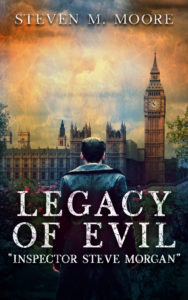 DI Earl Wilson was a police veteran who had started out as a patrol constable in London, a “bobby” or “top” as they were called, the latter for the helmet—and then bounced around the country after being promoted from PC to DC and finally DI, finally ending up in the Lake District, where he suspected he would retire someday because he loved hiking and fishing.
DI Earl Wilson was a police veteran who had started out as a patrol constable in London, a “bobby” or “top” as they were called, the latter for the helmet—and then bounced around the country after being promoted from PC to DC and finally DI, finally ending up in the Lake District, where he suspected he would retire someday because he loved hiking and fishing.
He was a big bear of a man, an oversized version of that American telly detective, Columbo, complete with old car and dirty raincoat, but he didn’t smoke cigars and didn’t drink much. In fact, for his age, he was in good shape. A criminal might outrun him, but they’d be hard-pressed to outfight him. He had once broken one’s jaw, but he’d gone to the hospital later to apologize to the hand-cuffed scrote for doing that.
Earl thought the lad had hooked another fish—beginner’s luck!—when he stood up in the boat and pointed across the lake waters. “There’s a boat with a body in it, Inspector!”
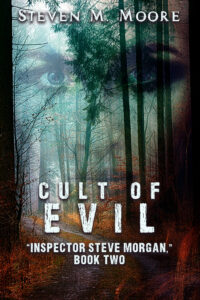 Earl didn’t stand—he knew better, and the boat was already swaying side to side. “Sit down, lad!” He squinted but still shaded his eyes. “I believe you’re right. Hopefully, just some fisherman taking a catnap. We made an early start too. The fish wake up and have breakfast early.”
Earl didn’t stand—he knew better, and the boat was already swaying side to side. “Sit down, lad!” He squinted but still shaded his eyes. “I believe you’re right. Hopefully, just some fisherman taking a catnap. We made an early start too. The fish wake up and have breakfast early.”
Kevin and Earl took the oars, not wanting to wake the bloke up by starting the motor if he was asleep but still feeling the responsibility of checking up on him. Unfortunately, Simon had been correct. There was a body in the boat, and the head trauma and blood indicated the man had been attacked.
“Lash the boat onto ours, you two,” Earl said. “I’m cranking up the outboard. We need to go ashore so I can use the radio in my old truck. We’ll need the SOCOs and a pathologist.”
“Is the boat a crime scene now, Guv?” Simon said.
Earl had to smile. The lad was mimicking his sergeant. She was a frequent guest at Martha and Kevin’s house along with Earl and Simon. Kathy and Simon lived above the repair ship in a bedsit; Earl had seen bigger closets in rich people’s mansions. The two were saving to lease or buy something bigger.
***
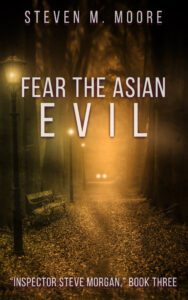 By the time the pathologist and SOCOs arrived, Earl had recorded what the three fishermen had seen. He sent Kevin and Simon home in Earl’s truck with his boat because Sally had arrived too. She could drop Earl at Martha and Kevin’s house so he could get his truck.
By the time the pathologist and SOCOs arrived, Earl had recorded what the three fishermen had seen. He sent Kevin and Simon home in Earl’s truck with his boat because Sally had arrived too. She could drop Earl at Martha and Kevin’s house so he could get his truck.
DS Sally Hill was from the other coast, loved the Lake District as well, and loathed southern England. Her birthplace was Morpeth, a regional capital not far from Newcastle-on-Tyne, so she felt right at home in Penrith that might be considered a left-coast town in comparison to Morpeth, without any polical meaning intended—the area along the border with Scotland was a conservative one.
Twenty years younger than her Guv, she was coming into her own as Earl’s partner in policing. She was fleet of foot and good enough at martial arts to compensate for her small size, as many a criminal had discovered. She also could turn on the charm, though, if she felt inclined or needed to do so in an interview or interrogation.
Sally became busy on her moby trying to identify the victim—miraculously she had a few bars; Earl’s 4G model had none—so Earl walked the lake shore, trying to find the spot where the rowboat had been set afloat with the body. There were two more moorings to the east and three to the west. He’d chosen to use theirs because he’d had the most luck fishing there.
His surveillance task took him a good forty minutes, but he found the probable launch point, the second of the three western moorings. He checked the third to make sure and then briskly returned. Arriving at the original site, he waved Harry, the lead SOCO, over.
“Second pier west of here has reeds beaten down. There are two old rowboats still there. I’m thinking our victim’s funeral boat might have been a third. There are recent car tracks, maybe from a Rover with one bald tire. Get what spoor you can find there, if you will.”
Harry nodded. “Any idea who owns those rowboats?”
“Maybe you can tell me that eventually. No names on the boats. Couple of diners and pubs hereabouts might know. I’ll be sending some DCs to help. The boats might just be abandoned, though.”
“Could be. The one the victim was in was old and ready to sink with a small hole in the bottom. Might have been the idea, to be honest, but his bloody shirt acted like a cork. Otherwise, we’d never have known what happened to the old geezer.”
“Old? How old?”
“Older than you, and that’s saying something.”
Earl ignored the taunt. “A local maybe?”
“We need to ID him, Guv. Could be, but you don’t know him and Kevin doesn’t, so maybe not. Not tourist season either, though. Someone passing through from down south maybe?”
“Any idea how long he’s been dead?”
“I’d guess he was put out in the lake last night sometime. Otherwise, the boat would have sunk despite the bloody shirt tail. But you’d better wait for Doc’s official TOD.”
“Might not be the same as the boat launch. You fellers can send me your reports. Sally and I had better start looking for mispers. Like you said, we have to ID this bloke.”
***
If Harry was right about the time the rowboat was launched, which meant the victim had been killed sometime before that, it was possible no one had reported the man missing yet. As a consequence, Sally and he stopped at a convenient pub during the trip back to the nick to have a quick pint and an early lunch. Earl took the opportunity to query the publican, who had no idea who their victim might be; the victim hadn’t patronized the club, which started selling breakfasts early in the morning.
Sally eyed her guv over her ale glass. “How did Simon handle that experience on the lake?”
“Happy to land his first catch, the lad was. He and Kevin are tight now. I guess the old man is the father Simon never had.”
“That’s not what I meant.”
“He spotted the rowboat and the body. Didn’t seem to give him much aggro. Can’t say he’s seen as many dead as a soldier might, but he’s certainly seen enough in his short life. Kind of gives one a thick skin. Almost seemed like he was more excited about us having another case to solve.”
“Maybe wanting to forget about his?” Earl shrugged. “I’d think the experience would have taken all the joy out of catching his first fish.”
“Lad’s a natural for that if he learns to handle the net. A few practice casts and he was ready to go.”
“And Kevin?”
“He’s an old hand.”
“I meant, how did he react to finding a body?”
“He’s an old soldier. He was more worried about Simon tipping our boat over. He didn’t know the victim, by the way. Neither do I. We need to get busy back at the station. I want to know who that bloke is. Or was. We can then pry into his life to see who would want to kill him.”
“Brutally.”
“I’ll give you that. Lots of anger at the very least.”
“So…should we get to it?”
“As soon as I can flag down Rita.”
“This place is busy, and it’s only eleven-thirty. I’ve never been here.”
“You should see it during the tourist season. We locals take these places for granted, but all the hikers and twitchers want to experience a cozy Lake District pub. They’ve turned the typical pubs into American sports bars in the Big Smoke, you know. They call it making London cosmopolitan.”
“That’s occurring in Newcastle too. Morpeth is a bit more sedate.” She frowned. “I’m not looking forward to preparing another murder board, Guv.”
He smiled. Their last major case had been Simon’s; they’d started out with eight victims in a case that eventually involved both MI5 and NCA. “Hopefully, we can keep the spooks off this one. Rick Barnes was a bit hard to take.”
Sally smiled. Earl knew she fancied the MI5 agent.
Major crime in the Lake District was rare except for spillovers from the big cities in the south and east: Birmingham, Durham, Liverpool, Manchester, and Newcastle. The Penrith Police District spent most of its time on solving lesser crimes, from stealing livestock and farm equipment to peddling illegal drugs. There were plenty of yobbies around, among them those who preyed on tourists, and they all kept the police busy enough. It was rare when the district’s CIDs saw the crime the big cities saw, though, especially what occurred so often in London.
***
As it turned out, there was a missing person. Mrs. Helen Simmons, a woman who ran a boarding house in a hamlet not far from the lake had been expecting a visit from her brother, Wayne Ross, a resident of Durham. The woman’s daughter was getting married and wanted her Uncle Wayne to give her away because her father had passed on.
Sally and Earl paid Mrs. Simmons a visit. She was already accompanied by a Family Liaison Officer who warned the two detectives that her charge was quite unstable. But the elderly woman agreed to talk to them, sitting down with them in the boarding house’s comfortable parlor with tissue box at the ready.
She didn’t look like a dowdy boarding house manager. Dressed to the nines, including what looked like a pearl necklace and earrings, fashionably coiffed hair, and expertly applied makeup, she could have looked good on any MPs arm…or an MP herself like the Iron Lady about to give a speech on the floor of Commons. Is the boarding house business that good? It wasn’t tourist season.
“Can you imagine? We’ve had to postpone the wedding to have a funeral!”
Sally glanced at Earl with eyebrows raised; he nodded. They had no idea when the pathologist and coroner would release the body, but Earl didn’t want to get into that. Sally followed his lead and made no comment about the dowager being more worried about the wedding than her brother’s demise.
“Tell me, Mrs. Simmons, about your brother. What did he do for a living?”
“Some kind of research. He is-was-a brilliant man, my little brother, a chemist who worked in a pharmaceutical company in Durham. Way beyond my understanding is what he did, but I think he invented new drugs to help people. I don’t think the rest of the family knew that. You know how it goes, detectives. I dare say none of them cared.”
For a moment, her grief had turned to anger. Sally was very familiar with dysfunctional families. She wondered how many guests had been coming to the wedding.
“What about his life in Durham? Was he married? Does he have family there?”
“Heavens no. We’re northerners, our Ross clan.” She slipped into some distant memory. “Simmons was my dear husband’s name. We owned and ran this establishment. Some of our customers return every year during the summer months. Other times we survive with traveling salespeople. Not the most elegant boarding house in the area, but our service is exemplary. Breakfast and/or dinner plans are available. Tell your relatives and friends.”
Sally smiled at the advert. “Do you remember the name of Wayne’s company?”
“No, but I have a business card somewhere. Hold on a moment.”
She left the room. They heard drawers opening and shutting. She soon returned triumphantly and handed Sally a card.
“Drake Pharmaceuticals,” Sally read. “Did he describe his work there in any more detail?”
“Only what I already said. And I wouldn’t have understood much more. Oh, he once told me had several patents. I think he meant he created several new drugs, right? Doesn’t one’s company hold the patents?”
“Generally that’s the case,” Earl said. “The researcher signs an agreement. Do you know anyone in the Penrith area who would want to harm your brother?”
“He got along with everyone, Inspector. He had the usual barneys with schoolmates growing up, but that was long ago. And he hasn’t lived in this area for donkey’s years. But he’s Barb’s only uncle. Barbara is my daughter.”
“I assume she’s disappointed,” Sally said.
“For the wedding, yes, but she’s enraged about how someone would do this to her Uncle Wayne. As we all are in the family. Please find who did this despicable act!”
“We’ll do our best, as always,” Earl said. He handed her his own card. “We might have to talk with again, Mrs. Simmons. And feel free to call us if you can think of anything more that might help us.”
***
Drake Pharmaceuticals had never heard of Wayne Ross. Had he lied to his family all those years? Had he even lived in Durham? Earl didn’t know what to think.
Sally managed to verify that he’d received a doctorate from Birmingham University. What could he have been doing if not employed by Drake?
They decided not to tell Mrs. Simmons, her daughter, or any other family members for the moment. Earl wanted to find out more about the mysterious scientist. He and Sally began to call other police departments in northern England, Earl using many contacts he’d developed over the years. Two DCs were trawling for anything in social media about Wayne.
The Home Office’s Border Force came up with one interesting item: Wayne Ross made a round trip in 2027 to Prague, capital of the Czech Republic.
“Not first on my list as a place to visit as a tourist,” Earl said, “so maybe he went for some other reason. Obviously not a business trip for Drake Pharmaceuticals, but maybe one related to his research?”
It all came down to knowing what the secretive man had been doing since he left the university years earlier. Someone had to know.
As much as Earl hated to trawl computer databases, he stubbornly went at it, finding one more item: Ross had purchased a new Range Rover in Aberdeen four years earlier, and he had paid for it in cash. The dealer had no home address or telephone number for the scientist. Earl bet it wouldn’t have been Durham at any rate. Had he been living there or some other place in Scotland?
Earl gave his team the task of answering that question, but that datum also suggested that Sally and Earl should pay Mrs. Simmons another visit. It was time to tell her that her little brother’s life wasn’t what she’d thought it was.
***
Comments are always welcome. (Please follow the rules found on the “Join the Conversation” web page. If you don’t, your comment is considered to be spam.)
“Inspector Steve Morgan” novels. You met DI Morgan in The Klimt Connection. In these three stories, he has a starring role. In Legacy of Evil, loose ends from Celtic Chronicles are resolved…and then some. The brutal murder of an old man starts things off, and three more occur. In Cult of Evil, Morgan’s team has a cult murder to contend with, and an assassin after Morgan adds an additional worry. In Fear the Asian Evil, the sister-in-law of Morgan’s sergeant is shot, and pursuing her shooter leads the team to a spy network. As a set, these three novels represent an ideal holiday gift for your family and friends who love British crime stories. Available wherever quality ebooks are sold, just not on Amazon.
Around the world and to the stars! In libris libertas!
 The “Jason Bourne” movies. You might identify Sean Connery with 007, but I identify Matt Damon with Jason Bourne even more. It took a while for me to get beyond the fact that Hollywood wasn’t following Ludlum’s storyline, especially with the second two movies in the series (I knew the third book quite well because I’ve used in as a reference on China, most recently in Fear the Asian Evil and earlier in Goin’ the Extra Mile—that third movie never mentions China!), but the essential mystery, thrills, and suspense from Ludlum’s books are there in the movie. And the third Bourne movie is probably the best action film ever made with a great actor performing. Eat your heart out, Tom Cruise!
The “Jason Bourne” movies. You might identify Sean Connery with 007, but I identify Matt Damon with Jason Bourne even more. It took a while for me to get beyond the fact that Hollywood wasn’t following Ludlum’s storyline, especially with the second two movies in the series (I knew the third book quite well because I’ve used in as a reference on China, most recently in Fear the Asian Evil and earlier in Goin’ the Extra Mile—that third movie never mentions China!), but the essential mystery, thrills, and suspense from Ludlum’s books are there in the movie. And the third Bourne movie is probably the best action film ever made with a great actor performing. Eat your heart out, Tom Cruise!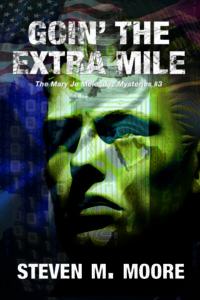 The “Indiana Jones” movies. Harrison Ford was only a goofball hero in the goofy fantasy series Star Wars that wants to be but fails miserably as hard sci-fi, and his best performance was in classic sci-fi film Blade Runner, but he is Indy in this Spielberg series. To not slight Sean Connery (his spy-fi slapstick roles as 007 don’t do justice to Fleming’s books), he almost steals the show as Indy’s father. That third movie was the best of the lot, but they all blazed new frontiers. Who knows how the new one will be.
The “Indiana Jones” movies. Harrison Ford was only a goofball hero in the goofy fantasy series Star Wars that wants to be but fails miserably as hard sci-fi, and his best performance was in classic sci-fi film Blade Runner, but he is Indy in this Spielberg series. To not slight Sean Connery (his spy-fi slapstick roles as 007 don’t do justice to Fleming’s books), he almost steals the show as Indy’s father. That third movie was the best of the lot, but they all blazed new frontiers. Who knows how the new one will be.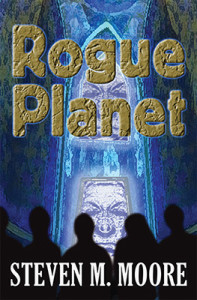 Comments are always welcome. (Please read the rules listed on the “Join the Conversation” web page.)
Comments are always welcome. (Please read the rules listed on the “Join the Conversation” web page.)


